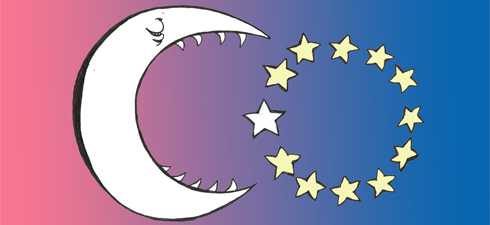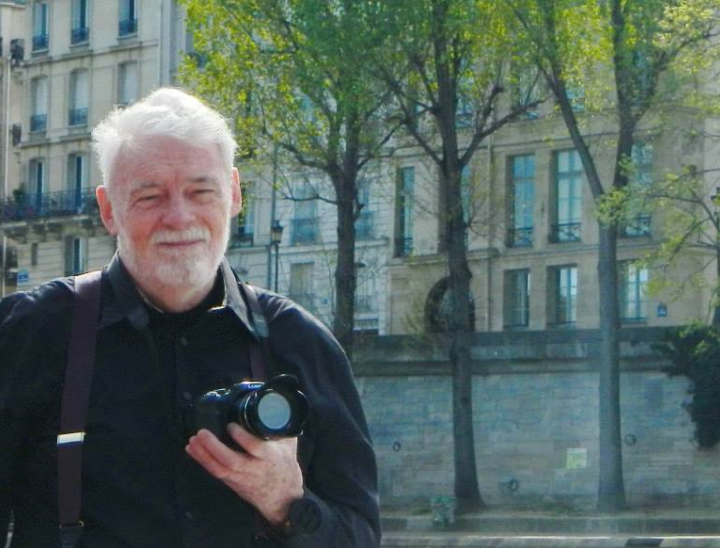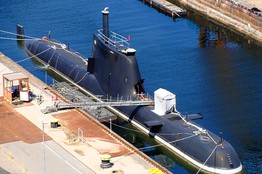The Wall Street Journal JULY 10, 2010


![The Submarine Deals That Helped Sink Greece 8 [SPARTAP1]](http://sg.wsj.net/public/resources/images/P1-AW167_SPARTA_NS_20100709200901.gif)
By CHRISTOPHER RHOADS
ATHENS–As Greece slashes spending to avoid default, it hasn’t moved
to skimp on one area: defense. The deeply indebted Mediterranean
nation, whose financial crisis roiled the global financial system
this year, is spending more than a billion euros on two submarines
from Germany. It’s also looking to spend big on six frigates and
15 search-and-rescue helicopters from France. In recent years,
Greece has bought more than two dozen F16 fighter jets from the
U.S. at a cost of more than EU1.5 billion.
Arne Lutkenhorst Among Greece’s questioned costs is more than a
billion euros on new submarines.
Much of the equipment comes from Germany, the country that has had
to shoulder most of the burden of bailing out Greece and has been
loudest in condemning Athens for living beyond its means. German
Chancellor Angela Merkel has admonished the Greek government “to
do its homework” on debt reduction. The military deals illustrate
how Germany and other creditors have in some ways benefited from
Greece’s profligacy, and how that is coming back to haunt them.
Greece, with a population of just 11 million, is the largest importer
of conventional weapons in Europe–and ranks fifth in the world
behind China, India,
the United Arab Emirates and South Korea. Its military spending is
the highest in the European Union as a percentage of gross domestic
product. That spending was one of the factors behind Greece’s
stratospheric national debt. The German submarine deal in particular,
announced in March as the country lurched toward bankruptcy, has
cast a spotlight on the Greek military budget and
on the foreign vendors supplying the hardware. The deal includes a
total of six subs in a complicated transaction that began a decade
ago with German firms. The arms sales are drawing heat from Turkey,
Greece’s neighbor and arch-rival. “Even those countries trying to
help Greece at this time of difficulty are offering to sell them
new military equipment,” said Egemen Bagis, Turkey’s top European
Union negotiator, shortly after the sub deal was announced. “Greece
doesn’t need new tanks or missiles or submarines or fighter planes,
neither does
Turkey.”
Greece’s deputy prime minister, Theodore Pangalos, said during an
Athens visit in May by Turkish Prime Minister Recep Tayyip Erdogan
that he felt “forced to buy weapons we do not need,” and that the
deals made him feel “national shame.” Other European officials have
charged France and Germany with making their military dealings with
Greece a condition of their participation in the country’s huge
financial rescue. French and German officials deny the accusations.
A spokesman for German Chancellor Merkel says the submarine transaction
was the culmination of an old contract signed long before Greece’s
debt crisis. In May, France’s defense ministry said Greek authorities
have confirmed their willingness to pursue talks on several
arm-procurement deals.
In May, Greece’s economic crimes unit began investigating all weapons
deals of the past decade–totaling about EU16 billion–to determine
if Greece overpaid or bought unnecessary hardware.
Bloomberg News Prime Minister George Papandreou and his government
have been chided over spending by Germany’s Angela Merkel. German
prosecutors are investigating whether millions of euros in bribes
were paid to Greek officials in connection with the sub deal. In
May, the chief executive of one of the German companies helping to
build the submarines, called
Ferrostaal AG, resigned amid the probe. For some prominent Greeks,
the latest submarine deal was the last straw. In late
April, Stelios Fenekos, a 52-year-old vice admiral of the 22,000-person
strong Greek Navy, resigned his position, bringing a three-decade
Navy career to an end. He says he did so to protest the Greek defense
minister’s decision to purchase the subs, as well as other decisions
taken in recent months that Mr. Fenekos considers “politically
motivated.” “How can you say to people we are buying more subs at
the same time we want you to cut your salaries and pensions?” says
Adm. Fenekos, in his first interview with a reporter. He was referring
to the government’s 5% cut in most pensions and even deeper slashes
to public-sector wages enacted in response to the crisis. The Greek
Navy, he says, cannot afford to maintain the additional submarines.
It currently has eight subs. A spokesman for the Greek Ministry
of Defense said Mr. Fenekos’ resignation was accepted. In stepping
down, “Mr. Fenekos did not refer to the submarine deal,” he said.
Greece became the first battleground in the Cold War, with the U.S.
backing anti-Communists in the Greek civil war in the late-1940s
against Communist insurgents. The conflict led U.S. President Harry
Truman, in 1947, to pledge unlimited military support for nations
under Communist threat, known as the Truman Doctrine. While the
rest of Western Europe used U.S. aid to rebuild its economy from
the second World War, in Greece, the emphasis was on building up
the military.
“Greece became the front line in the Cold War, and that began, right
then and there, the Greek economic crisis of today,” says Andre
Gerolymatos, a professor of Hellenic studies at Simon Fraser
University in Vancouver. By the mid-1950s, the U.S. pulled back
aid, much of which had been in the form of military hardware,
shifting much of the burden for Greek military spending to
Athens.
By this time, Greece’s worsening relations with Turkey led to yet
more arms spending. Despite being fellow members of the North
Atlantic Treaty Organization, the two nations are bitter rivals.
The discovery of oil in the northern Aegean Sea and disagreements
over territorial waters and airspace became the source of numerous–and
expensive–altercations between the two countries.
An incident in 1996, involving a Turkish ship running aground on a
rocky, uninhabited Greek islet, almost led to war. Greece later
that year announced a 10-year modernization program of its armed
services, costing nearly $17 billion. The U.S. over the years
catered to the two NATO members under a 7:10 ratio, meaning for
every $7 million dollars of equipment it sold to Greece it sold $10
million to the more populous Turkey. It was in that environment
that Greece in 1998 went shopping for submarines. It decided on
three German-built class-214 submarines, a state-of-the-art
diesel-electric powered vessel, with the option of buying a fourth–for
a total of EU1.8 billion. The first was to be built at the Kiel
headquarters of Howaldtswerke-Deutsche Werft GmbH, with the others
built at the affiliated Hellenic Shipyards SA, in Skaramangas,
Greece. The arrangement, called the Archimedes Program, would
preserve thousands of jobs
at the Greek shipyard. Greek officials in 2002 expanded it to
include the modernization of three older class-209 submarines–work
to be done at the Skaramangas shipyard using materials
and help from the Germans. The increase would cost another EU985
million.
The German side consisted of a company owned by German truckmaker
MAN SE, called
Ferrostaal, and Howaldtswerke-Deutsche Werft, now owned by ThyssenKrupp
Marine Systems AG. (MAN has since reduced its stake in Ferrostaal
to 30%.) The total cost of the new and renovated subs: EU2.84 billion.
As the military expenditures rose, Greece’s two main political
parties used them
as a political football, each trying to make the budget deficit
figures look worse when the other was in charge. When the Socialist
government first bought the submarines, it post-dated the accounting
for them to the day when the vessels were to be delivered, rather
than when they were purchased.
The government at the time was struggling to meet budget criteria
for entry into
the euro zone, which it joined a year behind other members in 2001.
Pushing back
the expenses saddled the bill with the Socialists’ successors, the
conservative New Democracy party, which came to power in March 2004.
The New Democracy government that year then used a similar tactic,
by
retroactively accounting for the expenditures on the date of purchase.
That inflated the budget deficits of the previous government–while
making it easier for the New Democracy government to meet its own
deficit goals.
Both accounting methods at the time were allowed by the European
Union. The resulting massive deficit revisions made in 2004 for the
previous years–4.6% of gross domestic product versus 1.7% for
2003–triggered an investigation in 2004 by Eurostat, the European
Union’s statistics agency, to understand what caused the revisions.
The findings did not result in any sanctions.
Military spending accounted for nearly a quarter of the difference
in the 2003 figures, and even more in revisions made on the deficits
for preceding years.
After the Socialist party, PASOK, returned to power in October 2009,
it made a similar maneuver: It announced the federal deficit was
much worse than the outgoing government had let on, mainly due to
public hospital debts, setting in motion the financial crisis.
Meanwhile, not one of the subs had been delivered. When Greek
officials traveled
to Kiel to test the first sub, called the Papanikolis, they said
that they found
that in certain sea conditions the submarine listed to the right.
“The Navy said
we cannot accept this sub,” said Mr. Fenekos, the admiral who
recently resigned.
“But the politicians did not want to stop it because they needed
the production for the workers in the shipyard here.” ThyssenKrupp
Marine Systems said the criticism was baseless and was made to delay
payment. By last fall, Greece had paid EU2.032 billion, about 70%
of the total owed. With the deal at an impasse, the German companies
cancelled the contract. Finally, in March, the two sides announced
they had begun negotiating a new deal. Instead of having three older
subs modernized, just one would be modernized, and Greece would buy
two additional new ones, bringing the total to six new submarines–costing
a total of EU1.3 billion.
Abu Dhabi MAR LLC, a shipbuilding company in Abu Dhabi, would buy
75.1% of the Greek shipyard, with the expanded submarine deal a
condition of the sale. The Greek government finally accepted the
sub, with the understanding it would immediately resell it. No deal
has been finalized.
Greece’s defense minister, Evangelos Venizelos, speaking to the
Greek parliament
in March, explained that the deal was an attempt to end the mess,
to “sever the Gordian knot” that the new government had inherited.
With 1,200 shipyard jobs at stake, Germany demanding concessions
on the complex deal, and Greece having already paid two billion
euros without receiving a single sub, the new arrangement was
necessary, he said.
But in February, just as a solution appeared to be at hand, German
prosecutors in Munich began turning up evidence of unsavory dealings,
according to records of their investigation.
Ferrostaal executives authorized payments worth millions of euros
to politicians
to win the initial deal in 2000, through a Greek company called
Marine Industrial Enterprises, according to the Munich prosecutor’s
records.
To do this, Ferrostaal used sham consulting contracts, according
to the records.
That company then distributed payments to “officials and decision-makers”
in Greece, according to the records. The investigation is ongoing.
No charges have been filed.
Adamos Seraphides, chairman of MIE Group Limited, a successor company
to a division of Marine Industrial Enterprises, said he doesn’t
believe that the company’s prior leadership was involved in bribery.
In March, police searched Ferrostaal offices, in Essen, seeking
evidence of bribe payments. In May, several executives stepped down.
“Ferrostaal will continue to pursue the intensive dialogue with the
state prosecutor’s office in Munich and has pledged full and
comprehensive support and
cooperation,” says a Ferrostaal spokesman.
A ThyssenKrupp spokesperson says the company got into the business
only in 2005,
when it bought Howaldtswerke-Deutsche Werft. Despite the tortuous,
decade-long journey of the submarine deal–and Greece’s precarious
financial standing–Germany stands ready for more business. Guido
Westerwelle, the German foreign minister, in February told a Greek
newspaper that Germany doesn’t want to force Greece to buy anything.
But “whenever it comes to the point when it’s ready to buy fighter
planes,” a European fighter-plane consortium, which Germany represents
in Greece, “wants to
be considered in the decision.”
A spokesman for Mr. Westerwelle says the minister didn’t discuss
fighter sales with the Greek government during the visit.–Alkman
Granitsas, David Crawford and
David Gauthier-Villars contributed to this article.







![The Submarine Deals That Helped Sink Greece 8 [SPARTAP1]](http://sg.wsj.net/public/resources/images/P1-AW167_SPARTA_NS_20100709200901.gif)